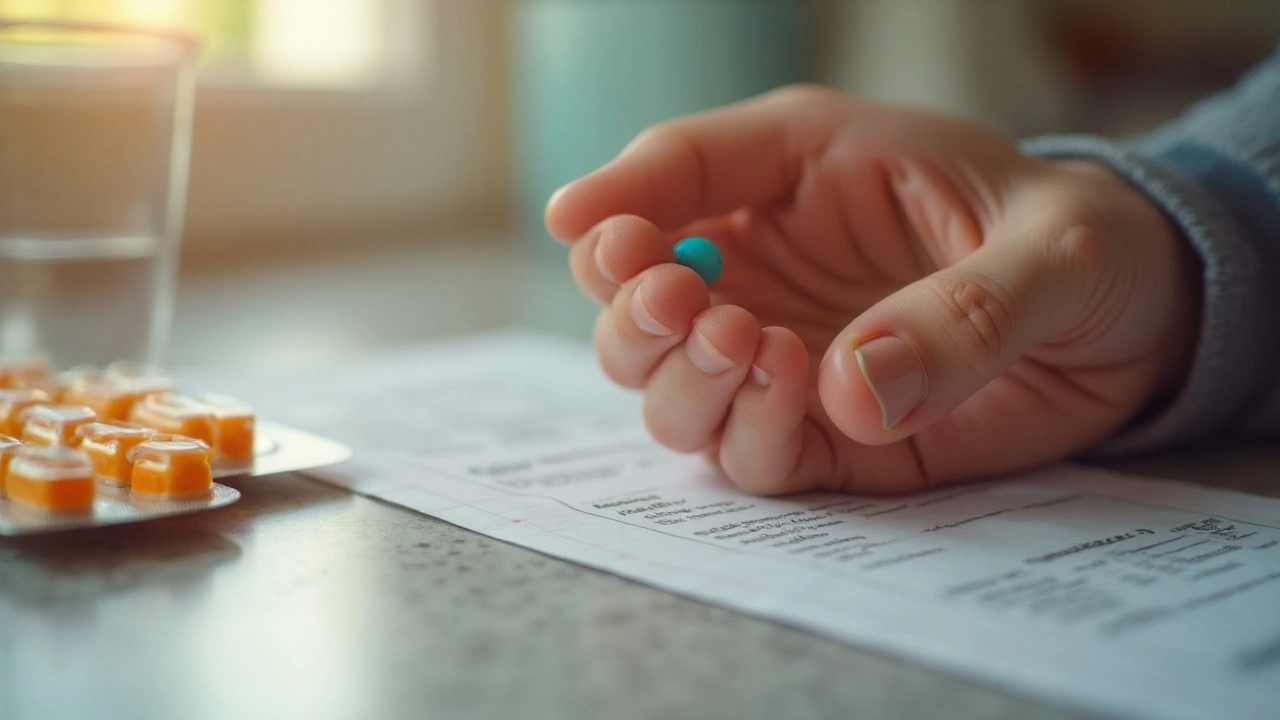TL;DR:
- Cardizem is the brand name for diltiazem, a calcium‑channel blocker used mainly for high blood pressure and certain heart rhythm problems.
- Typical oral doses range from 30mg to 360mg per day, depending on the condition and formulation.
- Common side effects include dizziness, headache, swelling, and constipation; serious risks involve low heart rate, low blood pressure, and liver issues.
- Always inform your doctor about other meds, especially beta‑blockers, statins, or anti‑arrhythmics, to avoid dangerous interactions.
- Regular monitoring of blood pressure, heart rate, and liver function helps keep treatment safe and effective.
What is Cardizem and How Does It Work?
Cardizem is the trade name for the drug diltiazem, which belongs to a class called calcium‑channel blockers (CCBs). In simple terms, CCBs relax the muscles of your heart and blood vessels by stopping calcium from entering the cells. Calcium is what makes muscles contract, so limiting its entry reduces the force of the heartbeat and widens the arteries.
Because of this dual action, Cardizem is commonly prescribed for two main reasons:
- Hypertension (high blood pressure): By relaxing the arterial walls, it lowers the pressure the heart has to pump against.
- Angina and certain arrhythmias: It eases the heart’s workload and helps restore a regular rhythm, especially in conditions like atrial fibrillation or supraventricular tachycardia.
There are three primary formulations on the market:
- Immediate‑release (IR) tablets - 30mg, 60mg, 120mg.
- Extended‑release (ER) capsules - 120mg, 180mg, 240mg, 300mg.
- Injectable form - used only in hospitals for acute rate control.
Each version is designed to give a slightly different release pattern, so your doctor will pick the one that matches your condition, lifestyle, and how your body reacts.

How to Take Cardizem: Dosage, Timing, and Practical Tips
Getting the dose right is crucial. Below is a quick rundown of typical starting points, but remember that doctors tailor the regimen to you.
Typical oral dosing
- Hypertension: Start with 30mg IR once daily; many patients move to 60mg IR twice daily or an ER capsule of 120mg once daily.
- Angina: 60mg IR three times a day, or 120‑240mg ER once daily, depending on severity.
- Rate control for atrial fibrillation: 60‑120mg IR twice daily, or 180‑240mg ER once daily.
Doctors often begin low and increase slowly to avoid sudden drops in blood pressure or heart rate.
Taking the medication
- Swallow ER capsules whole - do not crush or chew, as this can release the drug too quickly.
- IR tablets can be taken with or without food, but a light snack helps reduce stomach upset.
- Take it at the same time each day to keep blood levels stable.
- If you miss a dose, take it as soon as you remember unless it’s almost time for the next dose - then skip the missed one. Never double up.
Monitoring while on Cardizem
Regular check‑ins with your healthcare provider are a must. Expect these at the start and after any dose change:
- Blood pressure measurement - aim for <120/80mmHg, but your doctor will set a target based on your overall risk.
- Heart rate - a resting rate below 60bpm may be a sign to lower the dose.
- Liver function tests - diltiazem is processed by the liver, so abnormal enzymes signal a need to adjust.
- Electrolyte panel - especially potassium and magnesium, which affect heart rhythm.
Having a home blood pressure cuff and a simple heart‑rate monitor can make these visits smoother.
Common pitfalls to avoid
- Stopping abruptly can cause rebound hypertension. Taper under doctor guidance.
- Mixing with grapefruit juice - it can increase diltiazem levels and raise the risk of side effects.
- Skipping meals if you’re prone to dizziness - low blood sugar plus low blood pressure can make you feel faint.

Safety Profile: Side Effects, Interactions, and When to Call the Doctor
Every medication has a trade‑off. Knowing what to expect helps you stay ahead.
Typical side effects (1‑2weeks in)
- Dizziness or light‑headedness - especially when standing up quickly.
- Headache - often mild and fades as your body adjusts.
- Swelling of ankles or feet - due to fluid retention.
- Flushing, feeling warm, or a mild rash.
- Constipation - more common with higher doses.
Most of these settle within a few weeks. If they persist or worsen, let your prescriber know.
Serious but rare adverse events
- Bradycardia (heart rate <50bpm) - can cause fatigue, fainting, or chest discomfort.
- Severe hypotension - may lead to dizziness, blurred vision, or shock in extreme cases.
- Heart block - a conduction problem that shows up on an ECG.
- Elevated liver enzymes - can signal liver stress.
- Life‑threatening allergic reaction - swelling of lips, tongue, or throat, and difficulty breathing.
If you notice any of these, seek medical help right away.
Key drug interactions
Cardizem shares the metabolic pathway CYP3A4, so anything that messes with that enzyme can change its blood levels.
- Beta‑blockers (e.g., metoprolol): The combo can push heart rate too low.
- Statins metabolized by CYP3A4 (e.g., simvastatin, lovastatin): Increased risk of muscle toxicity.
- Antifungals (ketoconazole, itraconazole) and certain antibiotics (clarithromycin): Raise diltiazem concentration, upping side‑effect risk.
- Anti‑arrhythmics (e.g., amiodarone, quinidine): May cause dangerous slowing of the heart.
- Other CCBs (verapamil, amlodipine): Usually unnecessary and can lead to additive blood‑pressure drop.
Always hand your pharmacist a complete medication list, including over‑the‑counter drugs and supplements.
Contraindications - who should avoid Cardizem?
- Severe hypotension (systolic <90mmHg).
- Second‑ or third‑degree heart block without a pacemaker.
- Acute myocardial infarction (unless specifically ordered).
- Pregnancy - only if the benefit outweighs risk; most doctors prefer alternatives.
- Liver failure - drug clearance is impaired.
Frequently asked questions
- Can I drink alcohol while on Cardizem? Moderate alcohol is generally okay, but both can lower blood pressure, so drink cautiously.
- Is Cardizem safe for older adults? Yes, but start at the lowest dose and monitor kidney and liver function closely.
- Do I need to take Cardizem forever? Hypertension often requires long‑term therapy, but dose adjustments are common. Some patients taper off after lifestyle changes and blood‑pressure control.
- What should I do if I feel a rapid heartbeat? Pause the dose and call your doctor; it could be a sign of an interaction or a need for dose reduction.
- Can I switch from another calcium‑channel blocker to Cardizem? A physician can cross‑taper; don’t switch on your own.
Next steps for safe use
1. Set up a medication calendar - whether a phone reminder or a pill organizer, consistency matters.
2. Keep a log of blood‑pressure readings and any side‑effects. Bring this to every appointment.
3. Review your full medication list with your doctor at least annually.
4. If you’re planning surgery or any procedure, inform the team that you’re on Cardizem; it may need to be held temporarily.
Following these practices helps you get the benefits of Cardizem while keeping risks low.

Steven Shu
September 21, 2025 AT 18:52Been on Cardizem for 3 years now. My BP was 170/105 before. Now it's 122/78. No more chest tightness during walks. Just take it with breakfast and call it a day.
Rose Macaulay
September 22, 2025 AT 15:05I hate the dizziness at first. Took me 2 weeks to adjust. Now I just sit on the edge of the bed for a minute before standing. Small wins.
Prema Amrita
September 22, 2025 AT 16:52Cardizem is a lifesaver for atrial fibrillation. I’ve seen patients go from 140 bpm to 75 in 48 hours. But never skip the liver enzymes check. One patient I knew had transaminitis and didn’t know until it was too late. Monitor. Always.
Michael Harris
September 23, 2025 AT 10:26People treat this like candy. You think a 30mg tablet is harmless? Combine it with grapefruit, statins, or beta-blockers and you’re playing Russian roulette with your heart. I’ve seen 3 ER visits because of this. Stop being lazy and read the damn leaflet.
Vasudha Menia
September 23, 2025 AT 21:27So proud of you for sticking with it! 💪 I started on Cardizem last year and thought I’d never make it - but now I run 5Ks. You’re doing better than you think. Keep going! 🌞
Bryan Heathcote
September 24, 2025 AT 06:52Does anyone know if the extended-release version works better for nighttime palpitations? I take mine at 8am but still get fluttery around 2am. Wondering if switching to evening dose helps.
Hudson Owen
September 24, 2025 AT 17:33As a healthcare provider, I must emphasize that adherence to prescribed dosing schedules is paramount. The pharmacokinetic profile of diltiazem necessitates consistent plasma concentrations to maintain therapeutic efficacy and mitigate adverse events. Deviations may precipitate rebound hypertension or arrhythmia.
Sabrina Aida
September 25, 2025 AT 03:31Cardizem is just a corporate invention to keep people dependent on pills. Back in the 70s, people managed hypertension with diet, walking, and deep breathing. Now we’re told to swallow a capsule every day like obedient robots. Wake up.
Ellen Frida
September 25, 2025 AT 13:00so like... i think maybe the real issue isnt the drug but the fact that we live in a world that makes us stressed all the time and then gives us pills to fix the symptoms not the cause? like why dont we just fix the system??
Alex Rose
September 26, 2025 AT 12:37Cardizem’s calcium-channel blockade inhibits L-type voltage-gated calcium channels in cardiac and vascular smooth muscle, thereby reducing intracellular calcium flux. This results in decreased myocardial contractility, slowed AV nodal conduction, and peripheral vasodilation. Pharmacodynamically, it’s a class IV antiarrhythmic with antihypertensive properties. Nomenclature aside, it’s not magic.
Patrick Hogan
September 26, 2025 AT 18:18Oh cool, so you’re taking a drug that’s literally designed to slow your heart… and you’re fine with that? At what point does ‘treatment’ become ‘chemical sedation’? Just asking.
Snehal Ranjan
September 27, 2025 AT 07:09As someone from India where cardiac care is often delayed due to cost and access, I can say Cardizem is one of the most affordable and effective options available. Many patients here get generic diltiazem for less than $5 a month. It is not perfect but it saves lives. Let us not forget the global context.
Robert Burruss
September 27, 2025 AT 17:04It’s interesting… we treat the heart as if it’s a machine that needs tuning, but perhaps it’s more like a river - it flows, it resists, it adapts. Cardizem doesn’t fix the root - it just redirects the flow. Maybe we should ask: why is the river blocked in the first place?
Milind Caspar
September 28, 2025 AT 07:29Let’s not romanticize this drug. Diltiazem has been linked to increased risk of hepatotoxicity, especially in elderly patients on polypharmacy. The FDA Adverse Event Reporting System has over 1,200 cases of elevated liver enzymes tied to diltiazem since 2015. And yet, doctors still prescribe it like water. Who is auditing this? Who is accountable?
prajesh kumar
September 28, 2025 AT 08:44My uncle took this for 8 years and never had a problem. He walks every morning, eats dal and roti, and still jokes about his pills. Life isn’t about avoiding medicine - it’s about living well with it. Keep going, you’re not alone.
Alanah Marie Cam
September 29, 2025 AT 05:20For those experiencing constipation - increase fiber, hydrate, and consider magnesium citrate. Many don’t realize this side effect is manageable. Don’t stop the medication without consulting your provider. Small adjustments make a big difference.
Mim Scala
September 29, 2025 AT 11:57I’ve seen patients on Cardizem who never knew they had silent arrhythmias until their routine ECG showed it. This drug doesn’t just treat - it reveals. That’s why monitoring matters. Don’t skip the follow-ups. They’re not bureaucracy - they’re your safety net.
Steven Shu
September 29, 2025 AT 18:19Replying to @3411 - yeah, grapefruit is a silent killer with this med. I learned that the hard way. Now I drink orange juice instead. Simple fix, big difference.